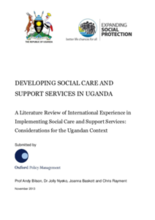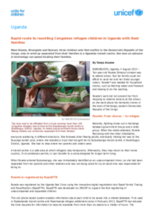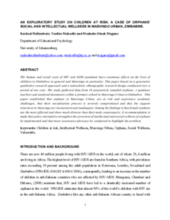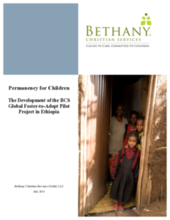Displaying 1281 - 1290 of 1622
This paper provides a review of international and Ugandan literature on social care and support services particularly focussing on identifying key lessons that are relevant to the Ugandan context.
RapidFTR is a versatile open-source mobile phone application and data storage system that seeks to expedite the Family Tracing and Reunification (FTR) process by helping humanitarian workers collect, sort and share information about unaccompanied and separated children in emergency situations so they can be registered for care services and reunited with their families.
The present study explored the changes resulting from the Teenage Mothers Project (TMP) in Eastern Uganda, a program that empowers unmarried teenage mothers to cope with the consequences of early pregnancy and motherhood, as well as factors that either enabled or inhibited these changes.
The study gathered data from 16 purposively sampled orphans, 4 guidance teachers and analysed documents within a primary school in Masvingo Urban in Zimbabwe.
This report provides a review of two projects: Building a Caring Environment for Children in Burundi (UNICEF), which addresses child care reform and New Generation (IRC) which addresses household economic strengthening and parenting skills.
Save the Children East Africa Regional Office (EARO) and Better Care Network (BCN) are looking to recruit a Better Care Network (BCN) Regional Technical & Knowledge Management Specialist.
This video describes the work of the Alternative Care Panel in Uganda, a panel composed of professionals who assess the stability of potential adoptive or foster parents to determine if the parents can provide for needy and vulnerable children, with the ultimate goal of keeping children out of institutional settings and in family-based care.
PAN has translated its materials into Portuguese, French, and Kiswahili.
The Child Adoption Network – East Africa is pleased to announce the First Child Adoption Conference in East Africa to be held in Nairobi, Kenya from 21 to 22 November, 2013.
This report provides initial documentation of a pilot program launched by Bethany Christian Services in 2009 in Ethiopia. The pilot aims at moving children from institutional care to family-based care by developing alternative family care for non-relative children using a foster-to-adopt approach, working through a partnership between faith communities in Ethiopia and American faith congregations in the US.





